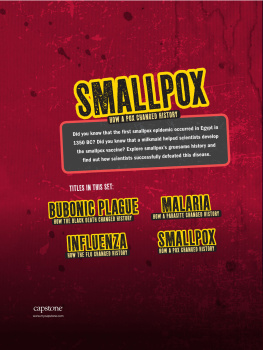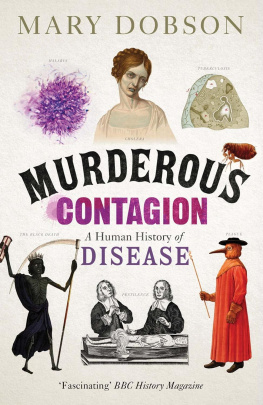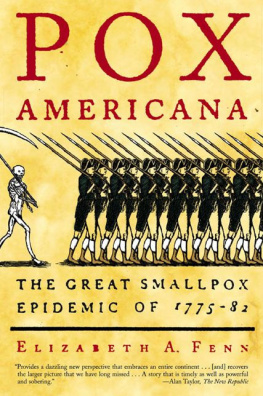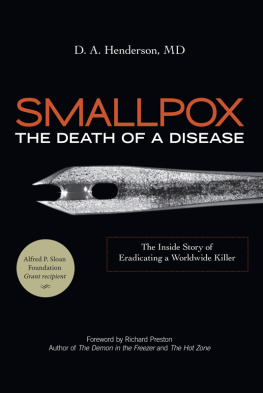Henderson - Smallpox: the death of a disease
Here you can read online Henderson - Smallpox: the death of a disease full text of the book (entire story) in english for free. Download pdf and epub, get meaning, cover and reviews about this ebook. City: Amherst;N.Y;Lancaster, year: 2009;2013, publisher: Gazelle [distributor], Prometheus, genre: Romance novel. Description of the work, (preface) as well as reviews are available. Best literature library LitArk.com created for fans of good reading and offers a wide selection of genres:
Romance novel
Science fiction
Adventure
Detective
Science
History
Home and family
Prose
Art
Politics
Computer
Non-fiction
Religion
Business
Children
Humor
Choose a favorite category and find really read worthwhile books. Enjoy immersion in the world of imagination, feel the emotions of the characters or learn something new for yourself, make an fascinating discovery.
- Book:Smallpox: the death of a disease
- Author:
- Publisher:Gazelle [distributor], Prometheus
- Genre:
- Year:2009;2013
- City:Amherst;N.Y;Lancaster
- Rating:4 / 5
- Favourites:Add to favourites
- Your mark:
- 80
- 1
- 2
- 3
- 4
- 5
Smallpox: the death of a disease: summary, description and annotation
We offer to read an annotation, description, summary or preface (depends on what the author of the book "Smallpox: the death of a disease" wrote himself). If you haven't found the necessary information about the book — write in the comments, we will try to find it.
Smallpox: the death of a disease — read online for free the complete book (whole text) full work
Below is the text of the book, divided by pages. System saving the place of the last page read, allows you to conveniently read the book "Smallpox: the death of a disease" online for free, without having to search again every time where you left off. Put a bookmark, and you can go to the page where you finished reading at any time.
Font size:
Interval:
Bookmark:

Published 2013 by Prometheus Books
SmallpoxThe Death of a Disease: The Inside Story of Eradicating a Worldwide Killer. Copyright 2009 by D. A. Henderson. All rights reserved. No part of this publication may be reproduced, stored in a retrieval system, or transmitted in any form or by any means, digital, electronic, mechanical, photocopying, recording, or otherwise, or conveyed via the Internet or a Web site without prior written permission of the publisher, except in the case of brief quotations embodied in critical articles and reviews.
Inquiries should be addressed to
Prometheus Books
59 John Glenn Drive
Amherst, New York 142282119
VOICE: 7166910133, ext. 210
FAX: 7166910137
WWW.PROMETHEUSBOOKS.COM
13 12 11 10 09 5 4 3 2 1
The Library of Congress has cataloged the printed edition as follows:
Henderson, Donald Ainslie, 1928
Smallpox : the death of a disease : the inside story of eradicating a worldwide killer / by D.A. Henderson ; foreword by Richard Preston.
p. cm.
Includes bibliographical references and index.
ISBN 9781591027225 (cloth : alk. paper)
ISBN 9781615922307 (ebook)
1. Henderson, Donald Ainslie, 1928 2. SmallpoxHistory20th Century. I. Title.
[DNLM: 1. Smallpoxepidemiology. 2. History, 20th Century. 3. Smallpox history. 4. Smallpoxprevention & control. WC 585 H496s 2009]
RA644.S6H46 2009
362.1969120092dc22
2009010087
Printed in the United States of America on acid-free paper
To my family, who provided both unflagging support and tolerant acceptance of the frequent absences of a father during the many challenging years of the smallpox saga: Nana, Leigh, David, and Douglas

Like the Pied Piper, D. A. Henderson came recruiting to the London School of Hygiene and Tropical Medicine. For those of us who followed, it was the beginning of an experience that shaped a lifetimeof lasting friendships and public health adventure so well described in this, the Pipers booka monumental work by an exceptional leader.
David L. Heymann, MD, assistant director-general for public health security and polio eradication, World Health Organization
Hundreds of millions contracted and died from smallpox and hundreds of thousands of smallpox eradicators were in the army that conquered this awful disease. But only D. A. Henderson could write a remarkable book like this from the perspective of the general who led that historic campaign. My hope is this story inspires those today who are fighting to add more diseases to the dustbin of history: polio, malaria, and Guinea Worm.
Larry Brilliant, MD, MPH, vice president and chief philanthropic evangelist, Google
In Smallpox, Dr. Henderson skillfully takes the reader from the earliest days of this plague through the comprehensive and complex global program that ultimately led to its successful eradication. He then offers a sobering yet intriguing account of relevant threats since then. Although he is generous in sharing the credit for this heroic accomplishment with a huge number of collaborators, his guiding presence is evident throughout this fascinating and wonderfully accessible account.
Andrew A. Sorensen, distinguished president emeritus, University of South Carolina
The eradication of smallpox was the greatest public health accomplishment of the twentieth century. But the lessons of the story... extend far beyond global health. D. A. Hendersons SmallpoxThe Death of a Disease makes me optimistic about our future.
Elizabeth Fenn, author of Pox Americana: The Great Smallpox Epidemic of 177582 and associate professor of history, Duke University
Smallpox describes how an international team of idealistic but pragmatic doctors and public health practitioners overcame... complex technical, logistical, and political challenges to eradicate an epidemic disease that had tormented humanity for millennia. It is a gripping and inspiring tale, punctuated by repeated setbacks and crises, and told with frank immediacy by the American physician who led the ultimately successful global campaign.
Jonathan B. Tucker, PhD, author of Scourge: The Once and Future Threat of Smallpox
From his unique perspective as the leader of the eradication team, D. A. Henderson tells the dramatic story of smallpox, the disease that killed more people than any other in history. Its eradication is, perhaps, mans most magnificent accomplishment. Dr. Hendersons account is spellbinding, and the lessons are the foundation of worldwide disease control.
Parker A. Small Jr., MD, professor emeritus, University of Florida College of Medicine, and charter member, National Vaccine Advisory Committee


On May 8, 1980, the World Health Organization (WHO) declared smallpox eradicated. No cases of smallpox had occurred anywhere on earth for more than two years; the smallpox virus, the cause of the worst infectious disease in history, had been removed from the human species. As much as anyone, D. A. Henderson was responsible for the eradication of smallpox. (The initials stand for Donald Ainslie; everyone, including his wife, Nana, calls him D. A.) He led the WHOs Smallpox Eradication Unit from its inception in 1967 through 1977 when the last naturally occurring human case of the disease occurred.
Many people, of course, contributed to this triumph. Those who worked in the project called it simply the Smallpox Program. I will call it the Eradication. It was one of the noblest and best things that we have ever done, as a species. The Eradication ultimately involved hundreds of thousands of people. They worked in many countries and they came from all walks of life, from top officials at the WHOs Geneva headquarters to village health workers who could not read or write but who could diagnose a case of smallpox faster than most physicians in the United States or Europe. When the Eradication began, in 1967, the World Health Assembly set a goal of ten years for the elimination of smallpox. The Eradicators referred to this goal as Target Zero. It meant no case of smallpox anywhere on earth. They missed the goal by only nine months.
As a virus, smallpox is an exceedingly small, infectious biological particle, a parasite capable of making copies of itself inside the cells of a host organism. It undergoes self-replication when it gets inside cells of its natural host, Homo sapiens. The human species is the only natural host of smallpox; no other organism harbors the virus. If a smallpox particle makes its way inside a human cell, it takes over the cells machinery and turns the cell into a factory for making more smallpox particles.
In the last hundred years of its existence, smallpox is thought to have killed at least half a billion people. All the wars on the planet during that time killed perhaps 150 million. In the contest of Smallpox vs. War, War lost. Smallpox killed roughly one-third of the unimmunized people it infected, and the disease was grisly.
Once a person was infected with smallpox, there was an incubation period of around ten days before the person became noticeably sick. Then the person got a high fever and severe aching pains. After two to three days, the patient would begin to develop a rash. The rash appeared on the face, hands, and feet, and quickly rose into pustules. Smallpox pustules were hard, pressurized blisters filled with a clear, faintly opalescent pus. The pain of the smallpox pustular rash was virtually unbearable. If the pustules merged into sheets, which was called a confluent rash, the patient was very likely to die. They died of shock.
Font size:
Interval:
Bookmark:
Similar books «Smallpox: the death of a disease»
Look at similar books to Smallpox: the death of a disease. We have selected literature similar in name and meaning in the hope of providing readers with more options to find new, interesting, not yet read works.
Discussion, reviews of the book Smallpox: the death of a disease and just readers' own opinions. Leave your comments, write what you think about the work, its meaning or the main characters. Specify what exactly you liked and what you didn't like, and why you think so.


